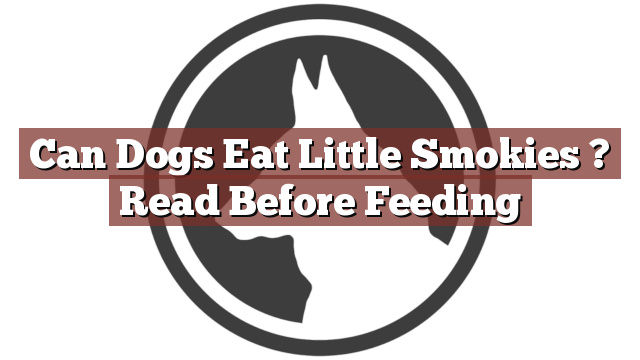Understanding Your Dog’s Dietary Needs
As a responsible pet owner, it is crucial to understand your dog’s dietary needs in order to provide them with a healthy and balanced diet. Dogs are primarily carnivorous animals, and their bodies are designed to digest and derive energy from meat-based foods. However, it is important to note that not all human foods are safe or suitable for dogs. While some foods can be a healthy addition to their diet, others can pose serious health risks. Therefore, it is important to research and consult with a veterinarian before introducing any new food into your dog’s diet.
Can Dogs Eat Little Smokies? Read Before Feeding
Can dogs eat Little Smokies? The answer is no. Little Smokies are small sausages that are typically made from pork, beef, and a mix of spices. While they may be a delicious treat for humans, they are not suitable for dogs. These sausages are often high in sodium, fat, and spices, which can be harmful to your furry friend’s health. Excessive consumption of such foods can lead to digestive issues, pancreatitis, obesity, and even salt poisoning in dogs.
Pros and Cons of Feeding Little Smokies to Dogs
Feeding Little Smokies to your dog may have some potential benefits but the risks outweigh the advantages. One possible advantage is that it could serve as a high-value treat for training purposes. However, there are safer alternatives that can be used for training without compromising your dog’s health.
On the other hand, the disadvantages of feeding Little Smokies to dogs are numerous. The high sodium content can lead to dehydration and kidney problems, particularly for dogs with pre-existing health conditions. The high-fat content can contribute to weight gain and increase the risk of obesity-related health issues. Additionally, the spices used in Little Smokies can potentially upset your dog’s stomach and cause digestive discomfort. It is always best to prioritize your dog’s health and choose healthier options for treats and rewards.
In Conclusion: Make Informed Decisions about Your Dog’s Diet
When it comes to your dog’s diet, it is essential to make informed decisions to ensure their overall well-being. While Little Smokies may be tempting to share with your furry companion, it is advisable to avoid feeding them to your dog due to the potential health risks involved. Instead, opt for dog-friendly treats that are specifically formulated to meet their dietary needs. If you have any doubts or concerns about your dog’s diet, consult with your veterinarian who can provide personalized advice based on your dog’s breed, age, and overall health. Remember, a healthy and well-balanced diet is the key to a happy and thriving dog.
Thank you for taking the time to read through our exploration of [page_title]. As every dog lover knows, our furry friends have unique dietary needs and responses, often varying from one canine to another. This is why it's paramount to approach any changes in their diet with caution and knowledge.
Before introducing any new treats or making alterations to your dog's diet based on our insights, it's crucial to consult with a veterinarian about [page_title]. Their expertise ensures that the choices you make are well-suited to your particular pet's health and well-being.
Even seemingly harmless foods can sometimes lead to allergic reactions or digestive issues, which is why monitoring your dog after introducing any new food item is essential.
The content provided here on [page_title] is crafted with care, thorough research, and a genuine love for dogs. Nevertheless, it serves as a general guideline and should not be considered a substitute for professional veterinary advice.
Always prioritize the expert insights of your veterinarian, and remember that the health and happiness of your furry companion come first.
May your journey with your pet continue to be filled with joy, love, and safe culinary adventures. Happy reading, and even happier snacking for your canine friend!

